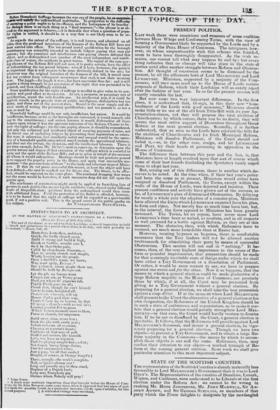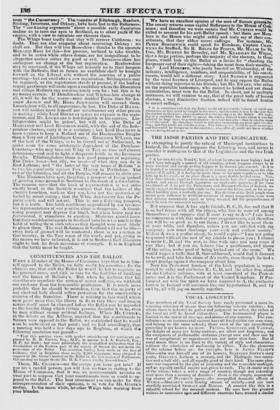STATE OF THE SCOTTISH COUNTIES.
THE representation of the Scottish Counties is already materially less. favourable to Lord MELBOURNE'S Government than it was to Lord Game's. The Representatives of the counties of Dumfries, Lanark, Wigton, and Caithness, were understood to be Liberals at the first election under the Reform Act : we cannot be far wrong in ranking Mr. HOPE JOHNSTONE, Mr. JOHN MAXWELL, Sir AN- DREW AGNEW, and Sir GEORGE SINCLAIR, as members of that party which the Times delights to designate by the newfangled term "Ike Couservaecy." The counties pf Edinburgbe Renfrew, Stirling; Inverness, and Orkney, hai-e been lost to the Reformers. The " ear-kissing arguments" about a possible early dissolution incline us to turn our eyes to Scotland, as to other parrecit the empire, a ith a view to calculate our chances there. The Whigs boast loudly that they will recover Caithness: we doubt. They are also sanguine about recovering Orkney : we shall see. But they will lose Ross-shire : thanks to the apostate HORATIO Ross for this—few persons, inclined to take trouble, and to be active while others dream, are too insignificant to be 'altogether useless either for good or evil. Inverness-shire has underuone no change at the last registration Renfrewshire may be recovered, if the Whigs act honestly up to their bargain with the Radicals, that in future no candidate shall be brought forward on the Liberal side without the sanction of a public meeting—but not until after a new registration. Stirlingshire may to regained, as the registration stands at present, if the leading county gentlemen will unite upon a candidate whom the Dissenters and village Radicals can conscientiously vote for : but this is by no means certain. If Dumfriesshire and Wigtonshire change at all, it will be for the worse—more decided Tories than Sir AN- DREW AGNLW and Mr. HOPE JOHNsTONE Will Succeed them. Lanarkshire will, to all appearance, be lost. The Duke of HAMIL- TON will neither move himself nor countenance any other person in moving ; while Lord DOUGLAS spares no expense in the regis- tration, and Mr. Locxusar is indefutigable in his canvass. Lin- lithgowshire might be gained, but will not. The Duke of Heal [LION and Lord Ross:melt could, with the aid of the lode- pendent electors, carry it to a certainty : but Lord DALMENY is more anxious to keep a Radical out of the Dunfermline Burghs than a Tory out of Linlithgow County. RODERICK 11I'LEOD, one of the best of the Whigs, is to be turned out or Sutherland, to make room for some aristocratic dependent of the Dutchess- Cointesa,—who may turn out W hg or Tory as time and chance determine,—and sent to fight a desperate battle in the Inverness Burghs. Edinburglishire there is a good prospect of regaining. The Tories boast—but idly, we trust—of what they can do in East Lothian; and " the hater of the very name of Reform " is to run his popularity against Fox Msrse in Perthshire. The rest or the Counties, and all the Burghs, will remain in stead quo. The Ministers have now, therefore, a prospect of lasing instead of gaining some ground in Scotland in the event tif a dissolution. The reasons are—that the basis of representation is nut sulii- cieatly broad in the Scottish counties; that the holders of the elective franchise, such as they are, Lave not the protection at-
lorded by secret voting ; that the Whig Aristocracy fear the Po- pular spirit, and will not act. This is not a flattering prospect,
but it is truth. The brisk confidence engendered by too ilivuura- lble representations of our psition alone is dangerous. A threat- ening prospect may depress the timid, but when brave men are forewarned, it stimulates to exertion. Ministers should know that their confidential agents in Scotland have been to much in the habit of telling them such tales as they thought were must likely to please them. The real Rs:formers in Scotland will not be idle— every inch of ground will be contested; there is no reaction in
that country, in the Tory sense of the word; and yet, owing to the causes we have indicated, it is not to Scotland that Ministers ought to look for fresh accessions of strength. It is in England that the battle must be fought.



























 Previous page
Previous page